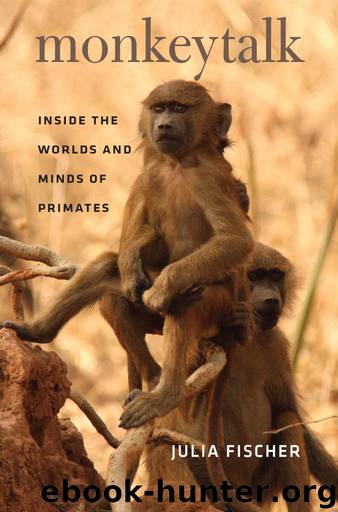Monkeytalk: Inside the Worlds and Minds of Primates by Julia Fischer

Author:Julia Fischer [Fischer, Julia]
Language: eng
Format: epub
ISBN: 9780226124384
Publisher: University of Chicago Press
Published: 2017-01-03T23:00:00+00:00
THE EVOLUTION OF INTELLIGENCE
This survey of the social intelligence of monkeys has afforded many insights. First and foremost, social learning plays an enormous role. In such social learning the work belongs to the learners, who must observe and orient themselves to the behavior of others. Evidence for instruction, the deliberate transmission of knowledge to others, is still minimal, however. The great apes together with some monkey species are able to distinguish intentions, although it is unclear whether they have not merely learned to make these distinctions on the basis of behavioral cues. Furthermore, evidence exists that the great apes at least have a rough conception of what others know, but not of what they merely think. The overall picture reinforces the view that primates are much more behavioral observers than mind readers. I suspect they spend very little time wrestling with the plans, purposes, and desires of their comrades. Far more important to them is what other animals are actually doing, and what they are able to predict of other animals’ future actions from observable behavior. To this end they take advantage of subtle indicators, such as gaze behavior, to gather information relevant to themselves. Finally, they have an exquisitely detailed social knowledge. They recognize each other as individuals, knowing even in large groups who belongs to whom and who stands in a dominance relation to whom, and guide their own behavior in accordance with how past interactions have unfolded. On the whole, then, primates stick to the observable evidence and interpret this to guide their own actions and choices. Unobservable processes—which for our own species constitute a vast trove of material for social reasoning—seem to be much less relevant.
Some critics chide that, as a general rule, “primates from orphanages” make up the majority of experimental subjects. For these critics, it is not surprising that the subjects fail in experimental tests. The animals, so the reproach goes, have experienced deprivation and display problematic behaviors; results of experiments with them can therefore never be truly convincing. What’s more, apes and monkeys are tested by another primate species (the human) whereas children tested for comparative purposes are tested by members of their own species, in a playroom setting with their mothers close at hand.128 But a more careful examination of results of many tests reveals that human children often perform just as poorly as apes or monkeys. Many test scenarios that adults find totally self-explanatory appear just as incomprehensible to small children as they do to chimpanzees or baboons. It is evident that the ontogenetic development of abstract thinking occurs rather slowly. Another fundamental problem is the comparison of adult monkeys to human children. If we were to compare the performance of apes to human teenagers or adults, the results would doubtless look considerably different. At the same time, the comparatively better performance of children in social cognition experiments possibly results not from species-specific differences alone but from radically different experience and socialization.
I assume that there are no fundamental differences in the cognitive operations that underlie the social or the physical intelligence of monkeys.
Download
This site does not store any files on its server. We only index and link to content provided by other sites. Please contact the content providers to delete copyright contents if any and email us, we'll remove relevant links or contents immediately.
Sapiens: A Brief History of Humankind by Yuval Noah Harari(14363)
The Tidewater Tales by John Barth(12649)
Mastermind: How to Think Like Sherlock Holmes by Maria Konnikova(7320)
Do No Harm Stories of Life, Death and Brain Surgery by Henry Marsh(6933)
The Thirst by Nesbo Jo(6930)
Why We Sleep: Unlocking the Power of Sleep and Dreams by Matthew Walker(6699)
Life 3.0: Being Human in the Age of Artificial Intelligence by Tegmark Max(5545)
Sapiens by Yuval Noah Harari(5364)
The Body: A Guide for Occupants by Bill Bryson(5079)
The Longevity Diet by Valter Longo(5057)
The Rules Do Not Apply by Ariel Levy(4957)
The Immortal Life of Henrietta Lacks by Rebecca Skloot(4571)
Animal Frequency by Melissa Alvarez(4459)
Why We Sleep by Matthew Walker(4433)
The Hacking of the American Mind by Robert H. Lustig(4375)
Yoga Anatomy by Kaminoff Leslie(4358)
All Creatures Great and Small by James Herriot(4310)
Double Down (Diary of a Wimpy Kid Book 11) by Jeff Kinney(4260)
Embedded Programming with Modern C++ Cookbook by Igor Viarheichyk(4173)
